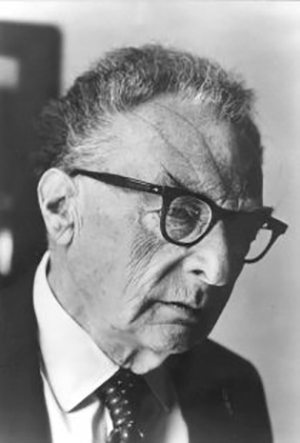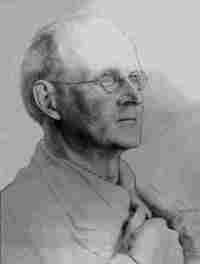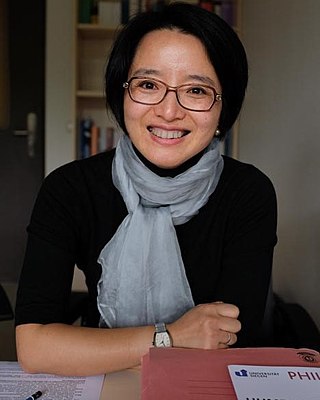Evolutionary linguistics or Darwinian linguistics is a sociobiological approach to the study of language. Evolutionary linguists consider linguistics as a subfield of sociobiology and evolutionary psychology. The approach is also closely linked with evolutionary anthropology, cognitive linguistics and biolinguistics. Studying languages as the products of nature, it is interested in the biological origin and development of language. Evolutionary linguistics is contrasted with humanistic approaches, especially structural linguistics.

Roman Osipovich Jakobson was a Russian linguist and literary theorist.

Friedrich Wilhelm Christian Karl Ferdinand von Humboldt was a German philosopher, linguist, government functionary, diplomat, and founder of the Humboldt University of Berlin, which was named after him in 1949.
Linguistic typology is a field of linguistics that studies and classifies languages according to their structural features to allow their comparison. Its aim is to describe and explain the structural diversity and the common properties of the world's languages. Its subdisciplines include, but are not limited to phonological typology, which deals with sound features; syntactic typology, which deals with word order and form; lexical typology, which deals with language vocabulary; and theoretical typology, which aims to explain the universal tendencies.
A worldview or a world-view or Weltanschauung is the fundamental cognitive orientation of an individual or society encompassing the whole of the individual's or society's knowledge, culture, and point of view. A worldview can include natural philosophy; fundamental, existential, and normative postulates; or themes, values, emotions, and ethics.

Johann Gottfried von Herder was a German philosopher, theologian, poet, and literary critic. He is associated with the Enlightenment, Sturm und Drang, and Weimar Classicism. He was a Romantic philosopher and poet who argued that true German culture was to be discovered among the common people. He also stated that it was through folk songs, folk poetry, and folk dances that the true spirit of the nation was popularized.

Charles Kay Ogden was an English linguist, philosopher, and writer. Described as a polymath but also an eccentric and outsider, he took part in many ventures related to literature, politics, the arts, and philosophy, having a broad effect particularly as an editor, translator, and activist on behalf of a reformed version of the English language. He is typically defined as a linguistic psychologist, and is now mostly remembered as the inventor and propagator of Basic English.
Scientific formalism is a family of approaches to the presentation of science. It is viewed as an important part of the scientific method, especially in the physical sciences.
Hans Georg Conon von der Gabelentz was a German general linguist and sinologist. His Chinesische Grammatik (1881), according to a critic, "remains until today recognized as probably the finest overall grammatical survey of the Classical Chinese language to date."

Hans Conon von der Gabelentz was a German politician who served as prime minister of the Duchy of Saxe-Altenburg from 1848 to 1849. He was also a gifted linguist and an authority on the Manchu language. He devised a standard romanized transliteration system for Manchu whose creation is often incorrectly credited to his compatriot Paul Georg von Möllendorff.
Frederick J. (Fritz) Newmeyer is an American linguist who is Professor Emeritus of Linguistics at the University of Washington and adjunct professor in the University of British Columbia Department of Linguistics and the Simon Fraser University Department of Linguistics. He has published widely in theoretical and English syntax and is best known for his work on the history of generative syntax and for his arguments that linguistic formalism and linguistic functionalism are not incompatible, but rather complementary. In the early 1990s he was one of the linguists who helped to renew interest in the evolutionary origin of language. More recently, Newmeyer argued that facts about linguistic typology are better explained by parsing constraints than by the principles and parameters model of grammar. Nevertheless, he has continued to defend the basic principles of generative grammar, arguing that Ferdinand de Saussure's langue/parole distinction as well Noam Chomsky's distinction between linguistic competence and linguistic performance are essentially correct.
Homaranismo is a philosophy developed by L. L. Zamenhof, who laid the foundations of the Esperanto language. Based largely on the teachings of Hillel the Elder, Zamenhof originally called it Hillelism. He sought to reform Judaism because he hoped that without the strict dress code and purity requirements, it would no longer be the victim of antisemitic propaganda. The basis of Homaranismo is the sentence known as the Golden Rule: One should treat others as one would like others to treat oneself.
Ranko Matasović is a Croatian linguist, Indo-Europeanist, and Celticist.
Linguistics is the scientific study of language. Linguistics is based on a theoretical as well as a descriptive study of language and is also interlinked with the applied fields of language studies and language learning, which entails the study of specific languages. Before the 20th century, linguistics evolved in conjunction with literary study and did not exclusively employ scientific methods.
Manfred Krifka is a German linguist. He was the director of the Leibniz Centre for General Linguistics in Berlin, and professor of general linguistics at the Humboldt University of Berlin. He is editor of the academic journal Theoretical Linguistics.

Romanticism in Scotland was an artistic, literary and intellectual movement that developed between the late eighteenth and the early nineteenth centuries. It was part of the wider European Romantic movement, which was partly a reaction against the Age of Enlightenment, emphasising individual, national and emotional responses, moving beyond Renaissance and Classicist models, particularly into nostalgia for the Middle Ages. The concept of a separate national Scottish Romanticism was first articulated by the critics Ian Duncan and Murray Pittock in the Scottish Romanticism in World Literatures Conference held at UC Berkeley in 2006 and in the latter's Scottish and Irish Romanticism (2008), which argued for a national Romanticism based on the concepts of a distinct national public sphere and differentiated inflection of literary genres; the use of Scots language; the creation of a heroic national history through an Ossianic or Scottian 'taxonomy of glory' and the performance of a distinct national self in diaspora.

In linguistics, the term formalism is used in a variety of meanings which relate to formal linguistics in different ways. In common usage, it is merely synonymous with a grammatical model or a syntactic model: a method for analyzing sentence structures. Such formalisms include different methodologies of generative grammar which are especially designed to produce grammatically correct strings of words; or the likes of Functional Discourse Grammar which builds on predicate logic.

Hans Christian Aarsleff is a Danish linguist and academic, who has served as emeritus professor of English at Princeton University since 1997. Aarsleff is a renowned specialist in the history of linguistics, the history of ideas, and the history of philosophy of the 17th, 18th, and 19th centuries.
Peter Kenneth Austin, often cited as Peter K. Austin, is an Australian linguist, widely published in the fields of language documentation, syntax, linguistic typology and in particular, endangered languages and language revitalisation. After a long academic career in Australia, Hong Kong, the US, Japan, Germany and the UK, Austin is emeritus professor at SOAS University of London since retiring in December 2018.

Zhao Jin is a Chinese professor of German linguistics and a scholar in cultural-analytical linguistics.








